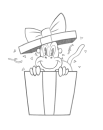$145
DOWNLOADS
assignment-mirroring.mp4
396 MB
mirroring-assignment.zip
2 MB
ASSIGNMENTS
Your assignment here is to download the provided assignment, and mirror the images provided.
So much of drawing is keeping it intuitive and methodical. This particular exercise is trying to get you guys to learn about comparative measurement. Once you're able to guarantee a shape is in the right spot every time, you'll easily be able to draw anything from observation. Once you get everything in its proper place, adding everything else is just a walk in the park.
This whole part of the course is deceptively simple, don't over complicate it and try not to get frustrated. Good luck!
Challenging assignment!
Critique welcome!
I might use a little better paper in the printer next time. 😄
Here is my mirror assignment. Any feedback would be appreciated!
Fyi, the paper folded accidentally, so it looks like a dark streak on his eye/forehead.
Hello! Learning a lot already and looking forwards to keep digging into the course.
Not sure how far we should take the head, so just tried mapping the shadows
Tried desperately to not get drawn into shading and trying to make “a pretty picture”. 😅. This was very hard and took forever. Very good exercise.
@Morgan Weistling Hi Morgan, loved the assignment; thanks for setting it up. I found it more tricky than I thought in the first place and it was a lot of fun to puzzle about it.
@Morgan Weistling I am loving the process and find it very interesting how my brain is affected by doing that type of drawing. It feels very unnatural to me and took a lot of effort and concentration to do the head. I kept getting which side of the eye, for instance that I was working mixed up. I really struggled and had to give it all my attention to really look and see, and observe. Near the end it was coming more naturally. I think this was a great exercise to do. I'm am going to try some more periodically. I drew it by observation initially and then used a measuring calliper (not sure what it's actually called) to make sure and correct where needed. For the vase, after I drew it (I used horizontal lines to mark spots I thought were important for comparison) and outlined it, i saw places I was off, so I tried to fix it by eye after I'd already outlined it with marker, so that explains the thicker pencil lines! I'm watching ahead in your videos then going back to do assignments. I'm excited to start the paint mixing exercises next! Thank you so much for doing this course! You're an excellent instructor!
First attempts at the mirroring assignment. Started with a grid but then switched off and just free handed. Shows on the chin. 🥴 struggle with my attention span.
For the vase I use 2 outside vertical lines and 1 center line. I also had to turn it upside down.....scary to see what one can miss when you do that! It is not perfect but tried to use as little help as possible.
For the head I did use a few measurements for some key proportions. Tried to eye as much as possible. needless to say, I did have to use my eraser here and there. further I used black matt graphite pencil, a mono zero eraser and a home made stump. I did struggle to get the darks dark enough.
Straight edge was used on the goblet. I ended up using a 90* triangle on the face so I could try to get some perpendicular help going. At least one of these lines based off the center I screwed up on and of course that was for the eyes so I ended up "fixing" them a couple times more times than I'd like to admit; before I caught that. Wolfs carbon on printer paper wasn't much fun either but I'm mitigating that by just not going full dark. Ie I'm too lazy I guess. Great exercises though. Practicing eyeing and measuring angles is never bad.
Fold your vase in half along its centerline and hold it up to light to see where you're off. Maybe turning the drawing upside down will reveal the discrepancies to you too.
I did this assignment with some horizontals and verticals instead of a grid and did the head from observation. I have been drawing that way for a while now.
I just folded the paper to make the grid markings for the vase, but for the tonal drawing I used my rolling ruler with 1 cm guides to grid everything. It's still difficult to get everything placed perfectly, but flipping it helps make it more obvious where to shave off edges that went off the mark using a mechanical eraser.





